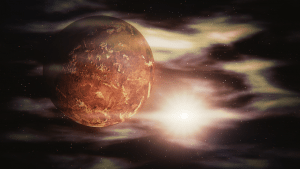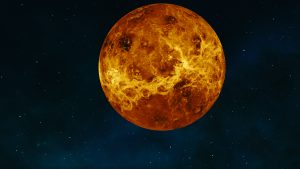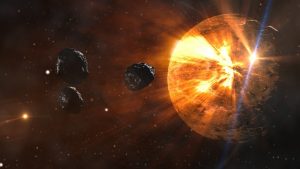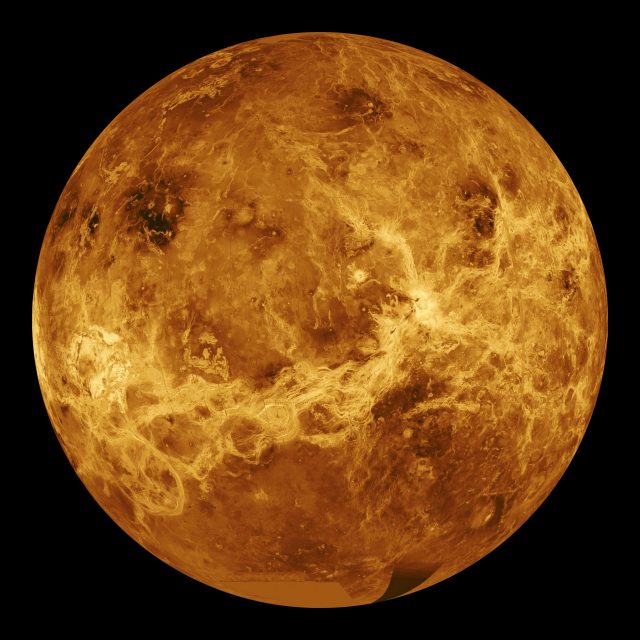Strange things are happening on Venus.
A gas never before seen on Venus has been discovered by astronomers – one that could, strangely, indicate that the hellish planet could have life under their acidic clouds. We cannot say for sure that the planet hosts life forms, as there wasn’t enough of the gas, however, just the fact that this gas exists in the clouds may be enough to suggest that there is something on Venus that we do not understand currently.
The gas found is called phosphine, an extremely toxic and explosive molecule that smells of dead fish and garlic. Astronomers found the gases presence within a layer of the planet’s clouds, which have a very similar temperature to our own. However, they only found traces of the gas in the sulfuric acid clouds.
“It’s equivalent to a few tablespoons in an Olympic sized swimming pool.” David Clements, Astrophysicist, Imperial College of London.
Due to the nature of this gas on our planet, the discovery of this gas is exciting – however small. There are two potential explanations for the gas; 1) it was man-made due to fumigants or biological weapons, or, 2) it was a sign of life on Venus.
Phosphine has been found on Earth in swamps and marshlands, as well as in animal guts and poop left behind. Most importantly, we know that this gas is heavily associated with life. This raises the possibility of microbes floating within clouds surrounding Venus.
“It has to come from something completely unexpected.”
 One of the other possibilities is that it was produced by something we can’t comprehend or understand now. So far, in extensive research by a team at Nature Astronomy, nothing has been made that can match the amount of phosphine found on Venus. They tried modelling the planet being struck by lightning strikes and meteors in the attempt to produce the same results.
One of the other possibilities is that it was produced by something we can’t comprehend or understand now. So far, in extensive research by a team at Nature Astronomy, nothing has been made that can match the amount of phosphine found on Venus. They tried modelling the planet being struck by lightning strikes and meteors in the attempt to produce the same results.
Molecular astrophysicist at MIT, Clara Sousa-Silva, states “that’s why this is such an extraordinary detection because it has to come from something completely unexpected.” She continues, “At some point, you’re left with not being able to explain it. Except we do know of a strange way of making phosphine on terrestrial planets – and that is life.”
Life on Venus can seem absurd – the planet depicts what many describe as a hellscape.
There would be significant difficulties finding hard evidence of life on Venus, however. The world on Venus is hard; it’s a barren wasteland that is completely surrounded by a thick atmosphere of carbon dioxide. Probes have quite literally melted while attempting to plunge to the planet’s surface to find evidence.
The best chance astronomers currently have of determining the life of foreign planets if by hunting for biosignatures in the planet’s atmosphere from afar.
 If it is discovered that this gas was produced by a life form, this would mean there was potential for us to visit the planet one day. While our attention has been on Mars, Venus has largely been unexplored in recent decades, despite its close proximity to us.
If it is discovered that this gas was produced by a life form, this would mean there was potential for us to visit the planet one day. While our attention has been on Mars, Venus has largely been unexplored in recent decades, despite its close proximity to us.
Microbe-hunting missions to the planet could be on the agenda with confirmation of phosphine. Those trips would be significantly more stringent in attempts to preserve and not contaminate the environment met on the planet.
Sarah Rugheimer, an astrobiologist as Jesus College, Oxford, says “it’ll need to be a global conversation of what the ethics of future observations of Venus are…If you’re talking about going in and scooping up the Venusian atmosphere and potentially disrupting the habitat, I think we need to have a conversation about that.”
“Extraordinary claims require extraordinary evidence.”
 Our life on Earth would change irrevocably if we found strong, definitive evidence of life on another planet. It would also alter our perception of what a habitable planet could be. In our search for life on other planets, the focus has been on planets that are similar to our own. Rugheimer states that “if it is microbes, then life is really different and can create creatures in environments that we might never expect.”
Our life on Earth would change irrevocably if we found strong, definitive evidence of life on another planet. It would also alter our perception of what a habitable planet could be. In our search for life on other planets, the focus has been on planets that are similar to our own. Rugheimer states that “if it is microbes, then life is really different and can create creatures in environments that we might never expect.”
Everything about this topic comes back to questioning whether we are alone in this universe – while some may not find it impressive that these microbes have been found on Venus, it opens up the possibility that life is so much richer than we thought.
However, this is just the beginning of something exciting for us all. It might be a long journey to discover what created the gas and whether Venus is actually habitable. But for now, there are no, and may never be, a definitive answer to our questions.



































